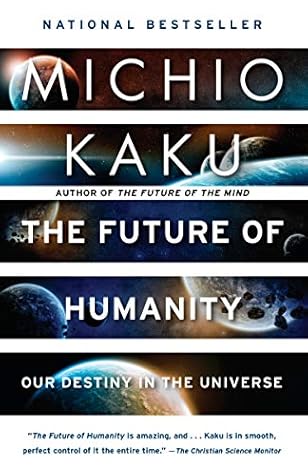More on this book
Community
Kindle Notes & Highlights
by
Michio Kaku
Read between
May 14 - May 16, 2024
Geneticists have noticed the curious fact that any two humans have almost identical DNA. By contrast, any two chimpanzees can have more genetic variation between them than is found in the entire human population. Mathematically, one theory to explain this phenomenon is to assume that, at the time of the explosion, most humans were wiped out, leaving only a handful of us—about two thousand people.
If we scan all the life-forms that have ever existed on the Earth, from microscopic bacteria to towering forests, lumbering dinosaurs, and enterprising humans, we find that more than 99.9 percent of them eventually became extinct.
Millions of species have appeared before us; they had their day in the sun, and then they withered and died. That is the story of life.
The Earth has already sustained five major extinction cycles, in which up to 90 percent of all life-forms vanished from the Earth.
If our long-term survival is at stake, we have a basic responsibility to our species to venture to other worlds. —CARL SAGAN
The dinosaurs became extinct because they didn’t have a space program. And if we become extinct because we don’t have a space program, it’ll serve us right. —LARRY NIVEN
there might be twenty billion Earth-sized planets orbiting a sun-like star in our galaxy alone. And since there are one hundred billion galaxies that can be seen with our instruments, we can estimate how many Earth-sized planets there are in the visible universe: a staggering two billion trillion.
Only the very courageous are willing to sit on top of a million pounds of rocket fuel to be blasted into space at twenty-five thousand miles per hour, not knowing if they are coming back.
Whenever we are faced with the awesome power of a volcanic explosion, or the devastation caused by a massive earthquake, we are encountering a demonstration of how the energy of the Earth’s radioactive core drives events on the surface and helps sustain life.
Galileo believed that science and religion could coexist. He wrote that the purpose of science is to determine how the heavens go, while the purpose of religion is to determine how to go to heaven. In other words, science is about natural law, while religion is about ethics, and there is no conflict between them as long as one keeps this distinction in mind.
The desire to know something of our neighbors in the immense depths of space does not spring from idle curiosity nor from thirst for knowledge, but from a deeper cause, and it is a feeling firmly rooted in the heart of every human being capable of thinking at all. —NIKOLA TESLA
Our only chance of long-term survival is not to remain lurking on planet Earth, but to reach out into space…But I am an optimist. If we can avoid disaster for the next two centuries, our species should be safe, as we spread into space. Once we establish independent colonies, our entire future should be safe. —STEPHEN HAWKING
Every dream begins with a dreamer. Always remember, you have within you the strength, and the passion, to reach for the stars to change the world. —HARRIET TUBMAN


